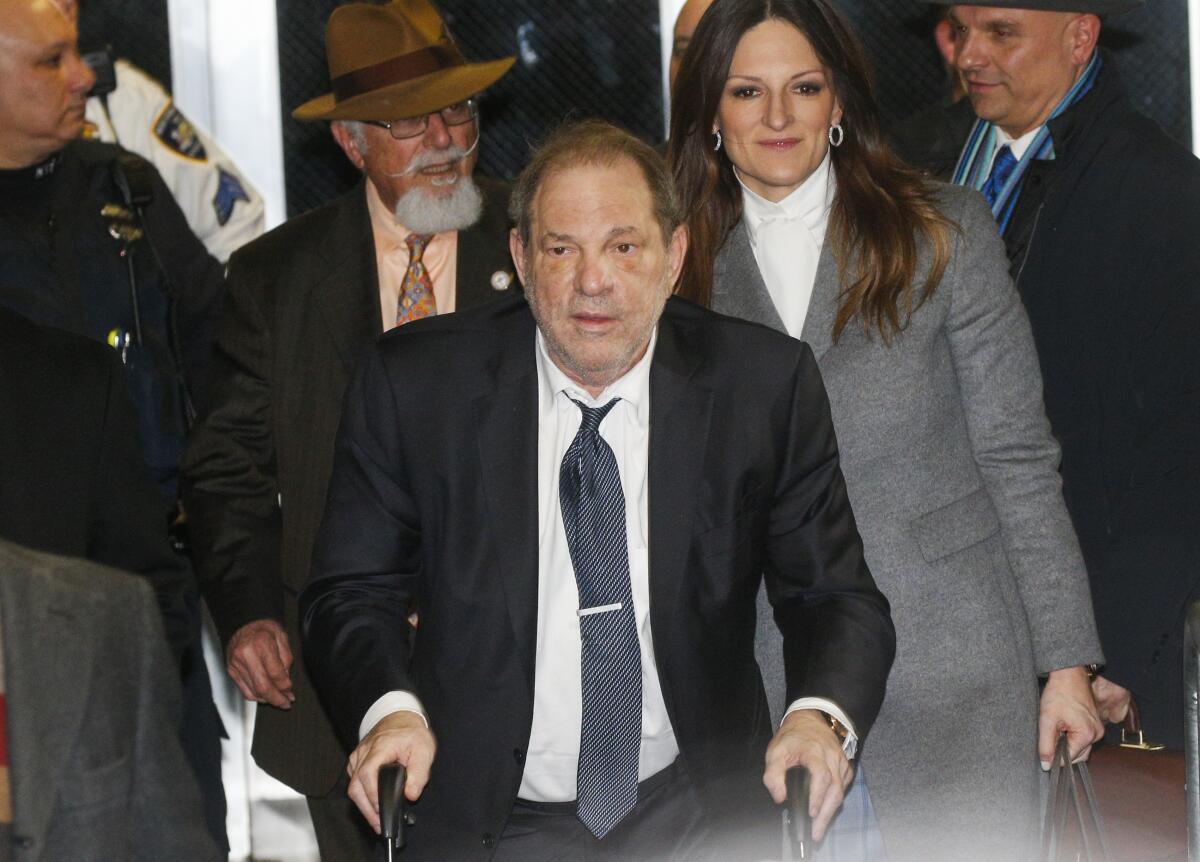Harvey Weinstein verdict: Jurors took women’s harrowing testimony to heart

- Share via
To some legal experts, the Harvey Weinstein sexual assault trial came down to one question jurors would have to sort out.
Would the panel believe the emotional testimony of women who said the movie mogul abused them, or would the testimony be colored by the praise and attention some of the women later gave Weinstein?
In the end, the jurors appeared swayed by the women’s accusations.
The jury found Weinstein guilty of one count of rape and one count of committing a criminal sexual act, with each crime connected to individual allegations made by accusers Mimi Haley and Jessica Mann. He was acquitted on the two most serious charges of predatory sexual assault, which each carried a potential life sentence.
It marks a victory for prosecutors, who took pains to show that the contact the women had after the attacks should not affect the credibility of their statements.
The prosecutors repeatedly reminded jurors that rape can occur within otherwise consensual and committed relationships.
What did Haley and Mann say in court?
Haley, a former production assistant on the Weinstein Co.-produced reality TV show “Project Runway,” said she first met the mogul at the premiere of “The Aviator” in 2004. Haley said the two had an awkward interaction at the Cannes Film Festival, where he requested a massage.
Not wanting anything more than a professional relationship with Weinstein, Haley said, she left.
Weinstein, however, would not relent, she alleged. He helped her land a job on “Project Runway” in New York, but also repeatedly asked her to travel to Paris with him for a fashion show, at one point showing up at her apartment uninvited, trying to convince her to take the trip, she said. He refused to leave until Haley made a joke about how Weinstein had “a terrible reputation with women,” which seemed to offend him, she testified.
Concerned she had fractured her most important relationship in the film and television industry, Haley said, she agreed to meet with Weinstein again at his SoHo apartment in July 2006.
She remembered the conversation being casual and friendly until Weinstein lunged forward and attempted to kiss her.
Panicked, Haley said, she kept retreating from Weinstein, even mentioning she was menstruating, until she stumbled backward into a bedroom. As Haley recalled the alleged assault, tears began streaming down her face.
“He pushed me down. He held me down by my arms … no, stay, like that … and I said, ‘No, no’ and at that time I started realizing what was actually happening and I thought … ‘This is being raped,’” she testified.
She said Weinstein had forcible oral sex with her.
Haley recalled a second incident two weeks later at a Tribeca hotel, where, she said, Weinstein threw her onto a bed and forced himself on her. In shock, Haley said, she lay still the entire time while the mogul called her a “whore” and a “bitch.”
“I didn’t resist. I just laid there,” she said, dabbing at her eyes.
Haley has since changed her last name from Haleyi, in part due to the high-profile nature of the Weinstein case. She first went public with her allegation in 2017.
A once-aspiring actress from a tiny Washington state dairy town, Mann’s testimony marked the most gut-wrenching portion of Weinstein’s trial. She spent three days on the stand recounting a harrowing relationship with the mogul that she said was consensual at times, but was also marked by verbal abuse, degradation and at least two instances of violent sexual assault.
Mann broke down on the stand during cross-examination, causing Supreme Court Judge James Burke to end proceedings for the day.
Mann said she met Weinstein at a Hollywood Hills party in 2013, and he initially expressed interest in her acting. Their early meetings were cordial — in one instance Weinstein escorted her through the shelves of Book Soup in West Hollywood to help her find reading material that might help her career — but the relationship quickly devolved into one entirely dependent on the mogul’s sexual desires, she alleged.
“It was like Jekyll and Hyde. He could be the most charming, informative person; he could lift you up to anyone he introduced you to and then behind closed doors it was ... dependent on if I gave him what he wanted,” Mann told jurors.
Mann said their relationship turned after a meeting for drinks at the Montage hotel in Beverly Hills to discuss a possible role in a “vampire movie.” Weinstein invited Mann and a friend up to his hotel room.
Once upstairs, Mann said through tears, Weinstein bullied her into a bedroom and forced oral sex on her.
Despite the alleged incident at the Montage, Mann said she later engaged in a number of consensual sex acts with him.
Mann said Weinstein was a “pseudo-father” to her and that she was desperate for the mogul’s approval in the acting field. She also described a consensual but harrowing relationship in which the Miramax co-founder treated her well in public but allegedly used her as a sexual plaything in private.
Mann said that though she felt “compassion” for Weinstein, she was not attracted to him. During their encounters, she said, Weinstein was domineering and verbally abusive. In one instance, she said, he urinated on her in a shower.
The two had only engaged in oral sex until 2013, when Mann said she traveled to New York to help arrange a meeting between Weinstein and a friend of hers working as an agent. The morning of the meeting, Mann alleged, Weinstein checked himself into her hotel. Fearing he was trying to set the stage for a sexual encounter, she said, she confronted him in the hotel lobby.
The mogul grabbed her by the arm and pulled her aside before leading her to the room, she alleged. Once inside, he physically barred Mann from leaving and ordered her to undress, she testified.
What was the defense strategy?
Defense attorneys repeatedly nudged the jury to consider what the aspiring actress stood to gain from her on-again, off-again relationship with Weinstein.
They pointed to the numerous invitations to Hollywood awards show parties Mann received from the producer, which she accepted. They showed the jury emails that demonstrated how Mann turned to Weinstein for help several times over their four-year correspondence. And they noted that as Mann struggled to establish an acting career, Weinstein got her an audition for the 2014 film “Vampire Academy.”
While cross-examining Mann and other accusers, Weinstein’s attorneys worked to upend the narrative of abuse the prosecution had built. They asserted that not only were the alleged encounters with Weinstein consensual, they were part of a calculated effort by the accusers to siphon connections, acting roles and other favors from the former Hollywood titan.
Prosecutors depicted Mann as a young, naïve woman from rural Washington state who met Weinstein at a Hollywood Hills party in 2013. Mann emphasized in her testimony that she never took advantage of him financially.
“He offered to give me things, I refused them all,” she told the jury.
Defense attorneys showed several emails in which Mann reached out to Weinstein after the alleged assaults. Her last sexual encounter with him was in late 2016, she said.
Mann turned to Weinstein when her father died and during a difficult breakup, emails show.
How did the prosecution try to rebuff that argument?
The prosecution’s final argument was designed to undercut the seeds of doubt painstakingly planted by Weinstein’s attorneys.
Prosecutor Joan Illuzzi-Orbon said that Weinstein kept in contact with his victims in order to control and isolate them. He dangled roles in front of his accusers, she said, some of whom were trying to establish their acting careers.
The prosecution outlined the ways in which the accounts of abuse were strikingly similar: interactions with Weinstein that fluctuated between validating and humiliating; the producer’s rapid changes in demeanor, which could sometimes swing from friendly to menacing in a matter of moments; and efforts to trick and trap the accusers in ways they said appeared premeditated.
“When you have to trick somebody to be in your control,” Illuzzi-Orbon said, “then you know that you don’t have consent.”
More to Read
Sign up for Essential California
The most important California stories and recommendations in your inbox every morning.
You may occasionally receive promotional content from the Los Angeles Times.












